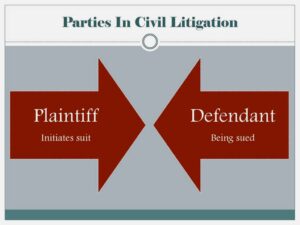
Edward Chapman Ltd v FS Property Inc 2022 BCCA 213 allowe3d an appeal where the Master had allowed a counter claim to be filed in opposition to a petition and categorically stated that there is no such thing as a counterclaim to a petition.
The proceeding was a foreclosure which must be commenced by petition.
There were other remedies available such as converting the petition to an action and allowing discoveries and a counter claim.
The overall structure of the Rules distinguishes between proceedings commenced by petition, and those commenced by notice of civil claim.
In essence, unless a proceeding falls within R. 2-1(2), or within another rule providing for a petition, or an enactment otherwise provides, the proceeding must be commenced by notice of civil claim.
However, certain categories of disputes must be commenced by petition, as set out in R. 2-1(2) and elsewhere in the Rules (and some categories must be commenced by requisition, which is not in issue here).
As such, the hearing of the petition is governed by the Rules applicable to chambers proceedings: R. 22-1(1)(a). Rule 22-1(7)(d) permits a court to order that there be a trial of an issue, and that pleadings be filed. This is expressly incorporated into foreclosure proceedings by R. 21-7(5). Rule 22-1(7) provides:
Without limiting subrule (4), on the hearing of a chambers proceeding, the court may
(a) grant or refuse the relief claimed in whole or in part, or dispose of any question arising on the chambers proceeding,
(b) adjourn the chambers proceeding from time to time, either to a particular date or generally, and when the chambers proceeding is adjourned generally a party of record may set it down on 3 days’ notice for further hearing,
(c) obtain the assistance of one or more experts, in which case Rule 11-5 applies, and
(d) order a trial of the chambers proceeding, either generally or on an issue, and order pleadings to be filed and, in that event, give directions for the conduct of the trial and of pre-trial proceedings and for the disposition of the chambers proceeding.
Rule 16-1 provides for the type of pleadings that can be filed in a petition proceeding.
Further, R. 16-1(18) provides:
Without limiting the court’s right under Rule 22-1 (7) (d) to transfer the proceeding referred to in this rule to the trial list, the court may, whether or not on the application of a party, apply any other of these Supreme Court Civil Rules to a proceeding referred to in this rule.
Rule 16-1(18) acknowledges the ability, under R. 22-1(7), to refer a petition proceeding to the trial list. This would involve converting the proceeding to an action, and giving directions for the filing of pleadings and any other necessary directions, as contemplated by R. 22-1(7).
But R. 16-1(18) also provides flexibility for a petition proceeding to employ some of the tools of an action for determination of issues within the petition proceeding itself, such as limited discovery. These tools can be borrowed and used selectively, while preserving the summary nature of the petition proceeding: see L’Association des parents de l’école Rose-des-Vents v. Conseil scolaire francophone de la Colombie-Britannique, 2011 BCSC 89 at para. 30.
R. 16-1(18) does not permit the filing of a counterclaim within a petition proceeding.
A counterclaim is provided for in R. 3-4. It is a form of pleading a claim, delivered within an action after a notice of civil claim has been filed. Rule 3-4(1) provides:
(1) A defendant in an action who wishes to pursue a claim within that action against the plaintiff must, within the time set out for the filing of a response to civil claim under Rule 3-3 (3), file a counterclaim in Form 3 that accords with Rule 3-7.
The form of a counterclaim is a prescribed form under the Rules, Form 3. The beginning of the form itself incorporates the words:
This action has been brought by the plaintiff(s) against the defendant(s) for the relief set out in the notice of civil claim filed in this action.
The logic of the Rules and Forms as a whole, make it clear that a counterclaim can only be advanced within an action. In my view, the decision of 1076586 Alberta Ltd. v. Stoneset Equities Ltd., 2015 BCCA 182, still applies, including the holding, at para. 60, that there would have to be an action (either by notice of civil claim or by order that the petition stand as a notice of civil claim), not a petition proceeding, in order for there to be a counterclaim.




